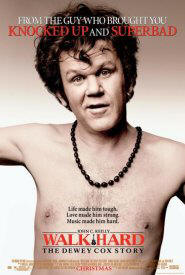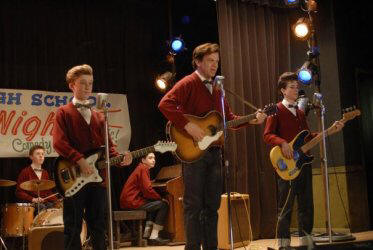|
Walk Hard: The Dewey Cox Story Reviewed By Rich Drees
With those words, you just know that something horrible is going to happen, and, as the film is co-written by Judd Apatow, the mastermind behind this past summer’s hits Knocked Up and Superbad, you also know it will be horribly funny.
Walk Hard: The Dewey Cox Story is a parody of the recent spate of rock star bio-pics like Ray and Walk The Line, taking the conventions of the genre and turning them on their ear. Where Walk The Line shows Johnny Cash’s drive to succeed fueled by the accidental childhood death of his brother, Walk Hard has its early rock and roll pioneer being haunted by the specter of the brother he accidentally cut in half with a machete on that very day he declared nothing horrible was going to happen. The local country doctor declared it one of the more serious cases of someone being cut in half that he had seen.
No cliché is
safe in the screenplay by Apatow and Walk Hard’s director
Jake Kasdan. Conversations and arguments are stiltedly written to
show their inspiration for Dewey’s various hits. Adult actors play
their characters in their teen years, surrounded by more age
appropriate supporting players. Long chunks of time go by in the
space of an edit, with only large amounts of wooden,
exposition-filled dialogue to cover the gap. As a teenage Dewey is
kicked out of his family’s home for daring to sing a song at the
high school talent show about something as obscene as holding a
girl’s hand, his 14-year old girlfriend leaves with him, swearing
eternal loyalty to his dream of becoming a famous musician. In the
next scene, several years later, she is surrounded by toddlers and
telling Dewey that he’ll never be a success.
As Dewey Forest Gumps his way through the early decades of rock and roll in a succession of bad wigs, he encounters other great rock pioneers like Elvis and the Beatles. He also encounters those eras illicit temptations, introduced to him by his band’s drummer, played by Saturday Night Live alum Tim Meadows, in one of the film’s most hilarious recurring gags. This movie aggressively works for its R rating, though the numerous raunchy jokes never become gross out moments just for the sake of being gross out moments.
Bringing the screenplay’s hero to life is John C. Reilly, really showing a recent flair for comedy after years of outstanding dramatic roles. Reilly’s work here is key to the movie’s success. In another’s hands the character of Dewey could have been played too broadly, becoming caricature. Reilly manages to root Dewey in the oddball reality Apatow and Kasdan have created for the film, helping make the laughs that often come at his expense that much heartier. |
 “Ain’t nothin’ horrible gonna happen today,” a young Dewey Cox says
confidently to his brother, as the two set out of playing on their
father’s farm.
“Ain’t nothin’ horrible gonna happen today,” a young Dewey Cox says
confidently to his brother, as the two set out of playing on their
father’s farm.